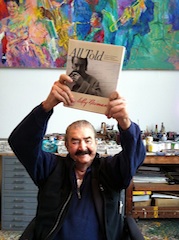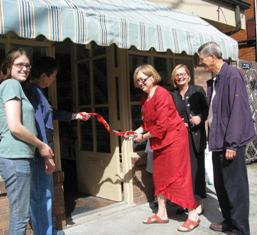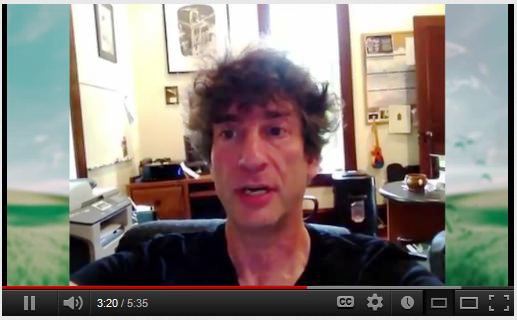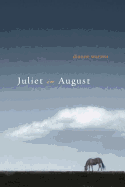 Diane Warren's debut novel, Juliet in August, won the 2010 Governor General's Award for fiction, one of Canada's most prestigious literary prizes. It richly deserves the honor.
Diane Warren's debut novel, Juliet in August, won the 2010 Governor General's Award for fiction, one of Canada's most prestigious literary prizes. It richly deserves the honor.
Juliet, Saskatchewan, might be considered a backwater. It's a dusty, mosquito-ridden town on the edge of the Little Snake sand hills. There isn't a lot going on in the dunes, downtown or in the town's living rooms. Nothing, that is, except vital, vibrant life, as lived anywhere else--but perhaps more quietly. In several overlapping stories, Warren etches the lives of Juliet's people in the reader's memory. No pyrotechnics, nothing flamboyant, just perfect descriptions of the singular events that fill the days and nights in Juliet.
It's a hot and blowy day when a horse, a fine-looking Arab, shows up on Lee Torgeson's property. Lee is the "shirttail relation," the foundling who appeared on Lester and Astrid's porch many years ago. Now, his adoptive parents are gone and he is uncomfortable with this generous legacy left to him. He idly mounts the horse and sets out for a short ride that turns into the 100-mile centerpiece of the story, threading its way through lives and stories, hours of a very long day spent ruminating, reminiscing, seeing people and sorting out what's next.
We meet Norval, the banker with a conscience, who grieves over the decisions he makes about poor farmers' loans and the foreclosures dispossessing them of their only way of life. His wife is taken up with the planning of the wedding of their pregnant daughter to a drunken kid. By story's end, everyone in that family will have to step into adulthood in a hurry.
Blaine Dolson, a father with too many kids and a dithery wife, comes to an epiphany about his own culpability for his situation and a new balance is found in that household. Lee rides dreamily through it all--he is a bit of a poet at heart--thinking about a long-ago similar ride done on a bet, remembering the words of Ozymandias: "Look on my works, ye mighty and despair," finding objects long buried in the eternal sands. Such is the rhythm of a day in Juliet.
At the end, Warren writes:
"The wind blows until dawn, releasing the past, howling at the boundaries of the present.
The land forever changing shape.
To the east, the pale pink of early morning."
Perfection. --Valerie Ryan
Shelf Talker: A long ride on a good horse through lives and a landscape, illuminated by Warren's insight into the generosity, pettiness, jealousy, love and fears of all of us.
 On July 1, Kepler's Books, Menlo Park, Calif., is closing for two months to make "a major overhaul both in the front of the store (new layout, restocking of books) and in the back (new computer systems, new staff training, etc)," as the store put it.
On July 1, Kepler's Books, Menlo Park, Calif., is closing for two months to make "a major overhaul both in the front of the store (new layout, restocking of books) and in the back (new computer systems, new staff training, etc)," as the store put it.



LEFTFIELDPUBLISHING.1118.S2.CONTEST.jpg)



 The
The  Although several months have passed since the
Although several months have passed since the 
 In what may be the last photo taken of LeRoy Neiman, who died last Wednesday, the 91-year-old artists here holds the first printed copy of his memoir, All Told: My Art and Life Among Athletes, Playboys, Bunnies, and Provocateurs (Lyons Press), just after he opened the package from the printer. Agent Steve Ross commented: "He worked for over a decade on that manuscript before he hired me to help corral it, give that wild rapscallion's story structure and discipline. It is a wonderful book and the suitable literary legacy he'd hoped it would be--but it took a village to make it happen in time for him to see it."
In what may be the last photo taken of LeRoy Neiman, who died last Wednesday, the 91-year-old artists here holds the first printed copy of his memoir, All Told: My Art and Life Among Athletes, Playboys, Bunnies, and Provocateurs (Lyons Press), just after he opened the package from the printer. Agent Steve Ross commented: "He worked for over a decade on that manuscript before he hired me to help corral it, give that wild rapscallion's story structure and discipline. It is a wonderful book and the suitable literary legacy he'd hoped it would be--but it took a village to make it happen in time for him to see it." Congratulations to Jean Haller, owner of
Congratulations to Jean Haller, owner of  Here's an unusual bookstore ownership opportunity that we might have to look into:
Here's an unusual bookstore ownership opportunity that we might have to look into: The Long Earth
The Long Earth Diane Warren's debut novel, Juliet in August, won the 2010 Governor General's Award for fiction, one of Canada's most prestigious literary prizes. It richly deserves the honor.
Diane Warren's debut novel, Juliet in August, won the 2010 Governor General's Award for fiction, one of Canada's most prestigious literary prizes. It richly deserves the honor.